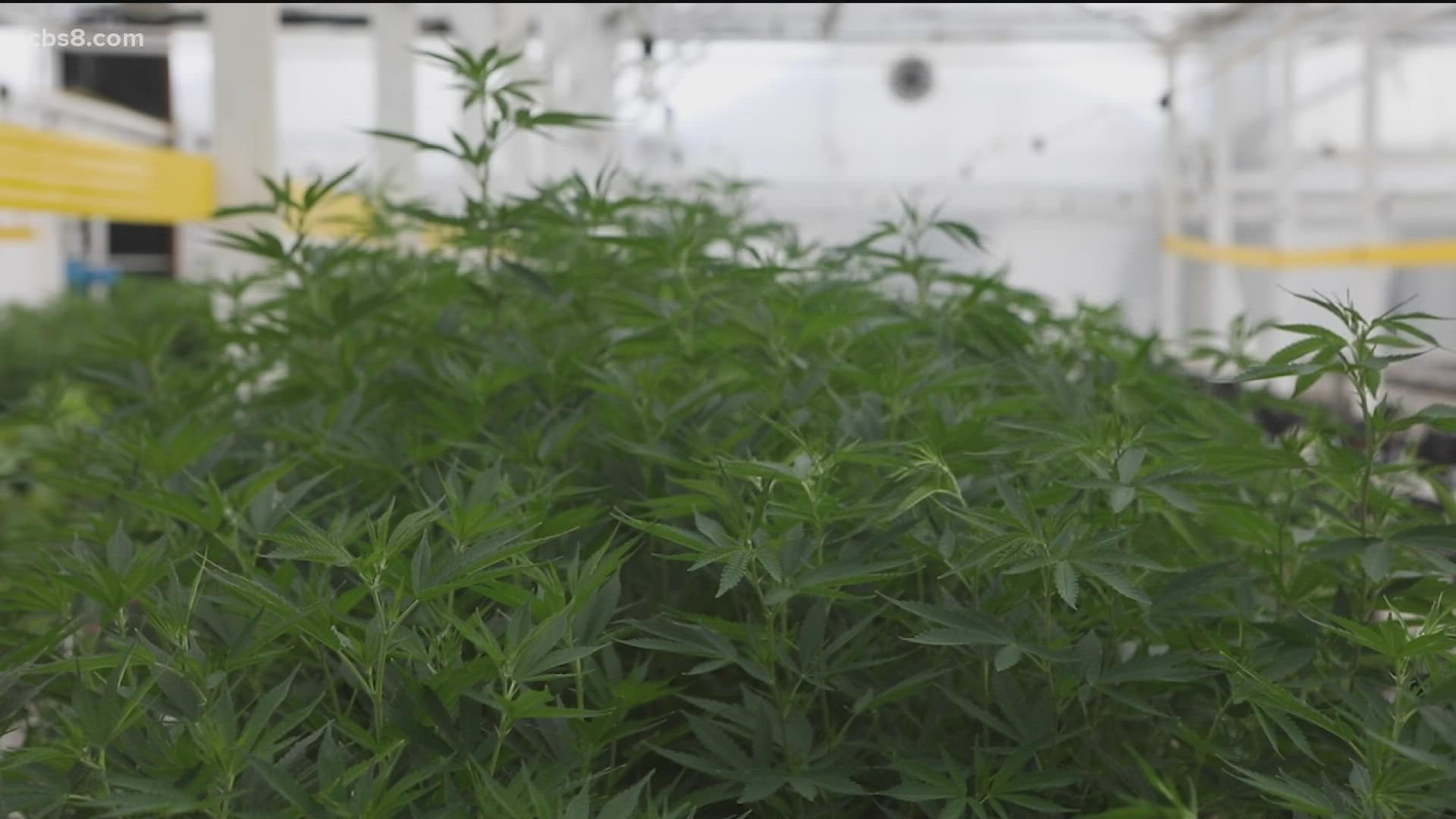SAN DIEGO COUNTY, Calif. — Environmental regulators found no evidence that the pesticides used on an Encinitas hemp farm impacted the health of its neighboring residents, but the investigation prompted by the neighbors’ complaints did find the hemp farm operator was misusing pesticides.
San Diego County conducted the investigation after neighbors complained for months of nausea, dizziness and respiratory problems. In the investigation, released in November, the county found hemp farm operator Cultivaris Hemp used unregistered products and maintained inadequate pesticide records. But it also concluded that those violations were unrelated to the health complaints. The department also said these violations were uncommon.
The county’s Department of Agriculture, Weights and Measures, which enforces pesticide laws in the county, is considering issuing a fine or warning letter to Cultivaris Hemp.
Following standard procedure, the department also referred the investigation to the district attorney after the state classified it as a priority investigation because it involved the well-being of at least five people.
The state can classify an investigation as a priority regardless of its outcome. The Environmental Protection Unit of the District Attorney’s Office could prosecute or refer it back to the department.
Cultivaris Hemp CEO Josh Schneider said he was glad to have the situation largely behind him now that the investigation is over and ended in his favor.
“We did the best work that we could and thought we were complying with the law at every turn,” said Schneider, who ran the hemp farm located at longtime flower farm Fox Point Farms until July. “It just seems to me that even the county report indicates that anything that happened was inadvertent.”
Joe Williams, who’s lived in the Fox Point Farms neighborhood for 30 years, said he's glad to see the county found some violations at the hemp farm, but he thinks the county may have come to a different conclusion about the relationship between the farm's activities and the neighbors' health issues had the investigation started sooner.
“I think maybe the investigation could've gone a little further, but I don't know what else they could come up with,” he said. “I'm just glad it's over.”
He said he has not seen new problems arise in the neighborhood over the last few months.
The tension between the hemp farm and neighbors that developed in Encinitas is one example of the issues that can arise as the hemp and cannabis industries develop in San Diego County.
The county is home to the second highest number of hemp growers in the state but has limited regulation. Meanwhile, the San Diego County Board of Supervisors is working on regulations for cannabis to be legally grown and sold.
Starting in October of last year, neighbors reached out to a dozen local, state and federal health departments and environmental regulators.
Officials at first chalked up the complaints to an odor issue, which they said they couldn’t do anything about because agriculture, including hemp production, is exempt from public nuisance laws dealing with odor.
Three departments investigated, according to the county’s report. And the farm was found to be following all applicable laws, except for its failure to obtain an Operator Identification Number to purchase and use pesticides for industrial hemp production.
The farm corrected that issue after the violation was flagged.
Then in April, the county launched a new pesticide investigation after learning from CalEPA, the state’s environmental protection agency, that one neighbor had reported being diagnosed with pesticide exposure to an enforcement officer with the state’s environmental protection agency.
After the investigation launched, the U.S. EPA, which regulates pesticides, copied Cultivaris Hemp in a letter to chemical company ProKure Solutions, which creates chlorine dioxide-based products to prevent mold, bacteria and other pathogens for use in a variety of commercial, residential and medical settings.
The environmental regulator was concerned that Cultivaris Hemp was misusing those ProKure products, which weren’t registered as pesticides, at the hemp farm.
The California Department of Pesticide Regulation found gas deodorizer ProKure D, the main product in question used by Cultivaris Hemp to mitigate the hemp smell, should be registered as a pesticide because it contains chlorine dioxide, which kills odor-causing bacteria. The department has asked ProKure Solutions to register the product.
ProKure did not respond to requests for comment on the investigation or on whether ProKure D has been registered as a pesticide.
Cultivaris Hemp also was found noncompliant for using two other ProKure products for research without proper research authorization. The company no longer uses ProKure Solutions products, Schneider said.
The county’s investigation found no connection between the neighbors’ health concerns and the farm’s use of pesticides in part because of a lack of medical evidence.
One neighbor was diagnosed with pesticide exposure during a visit to a hospital emergency room. That person shared the diagnosis with environmental regulators, triggering the more in-depth county investigation that involved sampling, interviews and inspections.
But that diagnosis was not enough to establish a link between the pesticides and the neighbor’s health issues, and the county sought other health records from the neighbors without success, the report said.
According to the county, none of the 16 identified complainants released medical records that pointed to harmful exposure.
Williams, one of the neighbors, said he chose not to provide his records because of mistrust he felt toward the county because of the months of back and forth on the issue prior to the investigation.
“Why would I trust somebody that’s probably has some other interest involved?” he said. “That's just the bottom line.”
Some neighbors are still pushing for more answers from the county.
David Dekker, who also lives in the neighborhood, emailed the county agricultural commissioner saying the county should have done more to evaluate wind direction and other weather factors around the time that neighbors had complained of sickness.
The county analyzed monthly wind history, various weather factors around the day in April that one neighbor received a pesticide exposure diagnosis and a day in May when HAZMAT was called. The investigator concluded that wind typically blows to the east, opposite from the neighborhood, which lies west of the farm.
Schneider said wind sometimes blows from the east and tunnels through the farm entrance toward the neighbors, so they stacked plastic bulb crates there to slow down the wind.
Dekker said he wanted the county to look at a more closely at wind and other weather factors during the days leading up to May 11, when the county conducted sampling.
Bob Echter, a second-generation flower farmer who owned the land that housed the hemp farm and his family’s flower farm said even though the situation was frustrating, he understands why the neighbors’ were concerned.
“You know, I have to realize that the neighbors don't understand farming, most of them,” said Echter, whose family owned and operated Fox Point Farms in Encinitas for decades. “I understand the farm situation and I have to realize that they don't, so it can create some concern on their end because they don't know my side.”
Encinitas city councilmember Tony Kranz, whose district includes the farm, said the investigation settles the question of whether neighbors were harmed by the pesticides, but questions about the regulation of hemp and cannabis farms, and whether there should be more restrictions on them, could persist.
That’s because some issues with policies only arise once they’re in effect, and the city is currently rolling out a new law, called Measure H, which will allow cannabis retail, cultivation, product manufacturing and distribution.
“We're able to at least get to the point where that issue of causation was addressed,” Kranz said. “But at the same time that doesn't really provide the kind of answers that the community wants. So it’s not clear where this will go.”
The neighbors had pressured local officials to consider extending setbacks to prevent farms from taking root so close to residential communities in the future. But they were told officials could not impose deeper setbacks under Measure H, which voters would have to change at the ballot box.
For now, Echter remains on the property as he continues his own flower production business. He’s begun to shift part of his operations to Mexico and has moved his warehouses to Carlsbad.
Fox Point Farms is now owned by a development company with plans to create the city’s new residential farming community, a plan that was in the works prior to when complaints about the hemp farm arose.
Schneider has since moved Cultivaris Hemp’s operations to Vista. He said he does not foresee dealing with similar problems there but that he takes what happened in Encinitas as a learning experience for the future.
Both Echter and Schneider said they have not heard from the neighbors since the hemp operations ceased.
“At the beginning of any new industry, there are challenges to work through — educational components to navigate with the public and the policy makers,” Schneider said. “I'm trying to chalk this whole experience up as a learning experience and a natural part of the beginnings of a new industry and the growing pains of a new industry.”
WATCH RELATED: Congress scrutinizing VA following inewsource investigation (November 2021)


